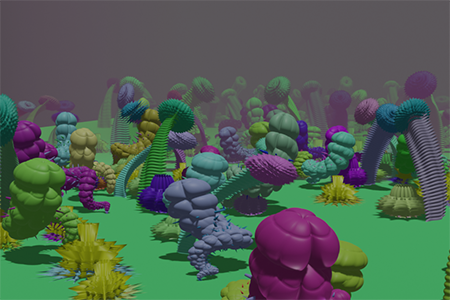O workshop terá lugar dia 27 de março, às 14:30, na sala I323.
Inscrições: https://forms.gle/ygPt14JE6a5soXaK6
Pelo formador:
“With the parametric tools in blender –geometry nodes– it is possible to create, with relatively simple node-based algorithms, great procedural pipelines. This functionality can be expanded with the integration of Python within blender, and amplify possibilities of creation and automation.
For this workshop, after some basic introduction of evolutionary algorithms and its application in creative practices, the participants have the opportunity to experiment with a custom designed evolutionary algorithm that can evolve a large variety of shapes. The shapes architecture is based on Johan Gielis’ Superformula. After we established our own dataset of shapes, through evolutionary selection, we’ll proceed with designing our own procedural algorithm to create a collection of artificial flora that the participants can use in their own virtual environments. Keywords: Blender, Evolutionary algorithms, geometry nodes, python, procedural modelling.”
Martinus Suijkerbuijk is an artist, designer and engineer that currently is working towards completing his artistic research PhD at the Trondheim Academy of Fine Art, Norway. His artistic research is focused on the concept of Computational Aesthetics, which he explores through the use of AI empowered Artificial Aesthetic Agents (AAA) in virtual environments. His diverse background has enabled him to present his research and work at cultural institutions such as ZKM and MetaMorf, as well as technology conferences like CHI 2018 and Philips Trend Event.
Para mais informação contactar o Prof. António Coelho (DEI)
